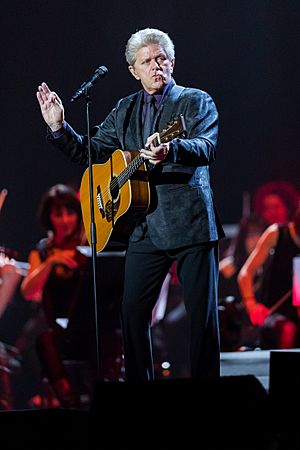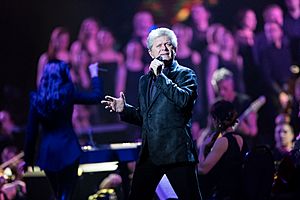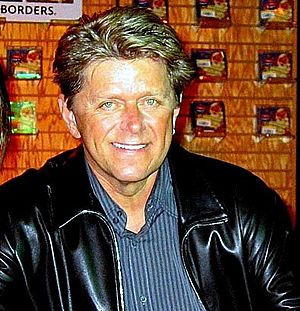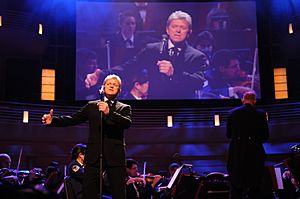Peter Cetera facts for kids
Quick facts for kids
Peter Cetera
|
|
|---|---|

Cetera in 2017
|
|
| Background information | |
| Birth name | Peter Paul Cetera Jr. |
| Born | September 13, 1944 Chicago, Illinois, U.S. |
| Genres | |
| Occupation(s) |
|
| Instruments |
|
| Years active | 1962–2019 |
| Labels | Warner Bros, River North |
Peter Paul Cetera Jr. (born September 13, 1944) is a retired American singer, songwriter, and musician. He is famous for being the lead singer and bassist for the rock band Chicago from 1967 to 1985. After leaving the band, he had a successful solo career.
With Chicago, Cetera sang lead on hit songs like "If You Leave Me Now" and "Hard to Say I'm Sorry". As a solo artist, he is known for number one hits like "Glory of Love" and "The Next Time I Fall". "Glory of Love" was the theme song for the movie The Karate Kid Part II and was nominated for an Academy Award.
Over his long career, Cetera recorded 17 albums with Chicago and eight as a solo artist. He was added to the Rock and Roll Hall of Fame as a member of Chicago in 2016. In 2017, he was also inducted into the Songwriters Hall of Fame.
Contents
Early Life and Music
Peter Cetera was born in Chicago, Illinois, as the second of six children. His family was of Polish and Hungarian descent. His mother was always singing around the house and taught her children to sing in harmony. At age 11, his parents bought him an accordion, and he became very good at playing it.
When he was 15, he saw a rock band perform and decided to buy a guitar. He later switched to the bass guitar and started playing in local bands with his high school friends. He was influenced by artists like the Beatles, the Ventures, and Bo Diddley.
Career with the Band Chicago
In 1967, Cetera joined a band called The Big Thing. He was impressed by their mix of rock and roll with a horn section. The band soon changed its name to Chicago Transit Authority, and then just Chicago. Cetera's high tenor voice was a perfect match for the band's other singers.
The band's second album, Chicago, made them famous worldwide. It included the hit song "25 or 6 to 4" with Cetera on lead vocals. He also started writing songs for the group, such as "Wishing You Were Here".
Major Success in the 1970s and 80s
In 1976, Cetera wrote and sang "If You Leave Me Now". It became Chicago's first number one hit single and won the band their first Grammy Award. This song made Cetera's ballad style very popular. Another hit he wrote and sang was "Baby, What a Big Surprise" in 1977.
In the early 1980s, Chicago made a huge comeback with the album Chicago 16. The album featured the number one hit "Hard to Say I'm Sorry", which Cetera co-wrote and sang. The next album, Chicago 17, was even more successful. It sold over six million copies and had four hit singles, all sung by Cetera, including "You're the Inspiration".
Leaving Chicago
By 1985, Cetera was very popular and wanted to make another solo album. He also didn't want to tour as much as the band did. Because they couldn't agree on the band's future, Cetera left Chicago in July 1985. He wanted an arrangement like Phil Collins had with Genesis, where he could be in the band and also have a solo career, but the band did not agree at the time.
Successful Solo Career
Cetera's solo career took off immediately. His first single, "Glory of Love", was the theme for the movie The Karate Kid Part II. It became a number one hit in 1986 and was nominated for an Academy Award and a Golden Globe Award.
His album Solitude/Solitaire was also a big success. It included another number one hit, "The Next Time I Fall", a duet with singer Amy Grant. In 1988, he released the album One More Story, which had the hit single "One Good Woman". The album also featured famous musicians like David Gilmour of Pink Floyd and Bonnie Raitt.
In 1989, he recorded the duet "After All" with Cher for the movie Chances Are. The song was a top ten hit.
Music in the 1990s and Beyond
Throughout the 1990s, Cetera continued to release music. His 1992 album, World Falling Down, featured the number one adult contemporary hit "Restless Heart". In 1995, he released One Clear Voice, which included a popular duet with actress Crystal Bernard.
In 1997, he released a collection of his greatest hits and duets called You're the Inspiration: A Collection. For this album, he re-recorded three of his famous Chicago songs because the band would not allow the original recordings to be used.
In 2004, Cetera released a Christmas album, You Just Gotta Love Christmas. He continued to tour and perform for many years, sometimes with a full orchestra.
Musical Style and Voice
Cetera is known for his unique high tenor voice. An interesting fact is that his signature singing style developed after he had his jaw wired shut following an injury in 1969. He had to learn to sing without opening his mouth very wide, which created his distinct sound.
As a bass player, Cetera was influenced by musicians like Paul McCartney. He was praised for his melodic and rhythmic bass lines that were a key part of Chicago's sound. He mostly played a 1963 Fender Precision Bass during his time with the band.
Retirement
In a 2019 interview, Peter Cetera announced that he was retired from touring and recording music. He said he wanted to stop performing before he lost his voice and was tired of all the travel. His last live show was in November 2018.
Personal Life
Peter Cetera has two daughters, Claire and Senna. He has lived in Ketchum, Idaho, since the mid-1980s and enjoys sports.
Discography
Studio Albums
- Peter Cetera (1981)
- Solitude/Solitaire (1986)
- One More Story (1988)
- World Falling Down (1992)
- One Clear Voice (1995)
- You're the Inspiration: A Collection (1997)
- Another Perfect World (2001)
- You Just Gotta Love Christmas (2004)
See also
 In Spanish: Peter Cetera para niños
In Spanish: Peter Cetera para niños
 | Janet Taylor Pickett |
 | Synthia Saint James |
 | Howardena Pindell |
 | Faith Ringgold |




